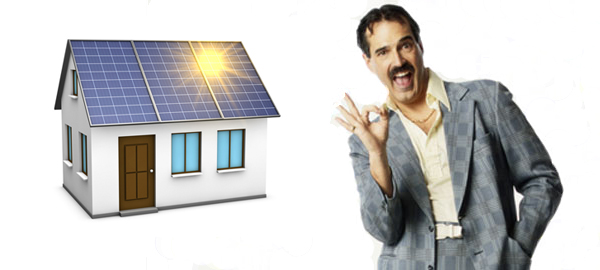 Residential rooftop solar leases have had a good run in the market, and why shouldn’t they…? They require no money upfront for systems that cost thousands of dollars while the financial and emotional reward is immediate. Problem is (and we’ve seen it before), when a business model is built to benefit only the companies while the consumer gets a the short end of the stick, eventually, the true “advantages” of owning that solar lease inevitably percolate to the surface.
Residential rooftop solar leases have had a good run in the market, and why shouldn’t they…? They require no money upfront for systems that cost thousands of dollars while the financial and emotional reward is immediate. Problem is (and we’ve seen it before), when a business model is built to benefit only the companies while the consumer gets a the short end of the stick, eventually, the true “advantages” of owning that solar lease inevitably percolate to the surface.
A recent article by Bloomberg “Rooftop Solar Leases Scaring Buyers When Homeowners Sell” lists experiences of homeowners who have had a solar lease and faced various challenges when attempting to sell a house. Also, having received a few personal e-mails after people have read my previous article “Secrets of Residential Solar Lease – Sweet Deal or Disastrous Rip-off?” I’ve compiled for you a few more points to reflect on because frankly, I find that most people who acquired their rooftop solar via a lease were neither informed of these issues by a salesman, neither they ever considered them themselves. Here are the five of these conversation pieces that the solar lease companies would be happy to avoid:
1. Solar Lease May Hurt Your Home’s Value
Solar lease may not add value to your house. In fact, it can devalue your house. In general, people who own rooftop solar enjoy an added value to their home but not with the leases. Buyers shy away from them because they straight out don’t like the deal or simply do not understand it. Some appraisers say that to many potential buyers a solar lease is a liability rather than an asset, and may drive people away. In the Bloomber article, Dorian Bishopp blames the solar panels on his roof for costing him almost 10 percent off the value of the home he sold in March. According to the Bloomberg article Scott Vineberg, a SolarCity customer, received multiple offers for his home in Scottsdale, Arizona, home he sold in January, 2014. Unfortunately, the lease made the deal more complicated because the buyers were reluctant to take over the contract and asked him to pay off the balance in advance, that is 10 years of payments.
Check out another comment by TetonNiki in the same article:
My father-in-law signed up for one of these deals and when he passed away we had a very difficult time selling his house. Seriously, it is not my realtor’s job to pre-screen buyers for their credit scores!!! We lost quite a few potential buyers once they learned about the lease. We finally had to lower the price about $10K and wrangle with the leasing company to reduce the price of the system to the “real” market price (as opposed to the over-inflated lease price) and sell it to our buyer (who was savvy about solar thankfully). The family that bought the house then used the money saved on the home price to purchase the system outright. It was a total stressful nightmare on top of the death of a relative. And I have to say, the leasing company was very rude.
2. Credit Score Hurdle
What many solar lease owners may not be aware is that the new buyer of the house will also have to qualify for the lease in order for it to be “assumed.” There have been cases when a buyer’s credit score was a few points short of the solar company’s minimum, and the transfer was rejected.
3. Breaking a Solar Lease is Not an Option
In order to break it, you will be asked to pay off the balance in advance. If you do pay off the balance, it will be a full price of the panels – no state or federal credits for you.
4. You May Be Paying More for Solar Lease Than to Your Utility Company
It is entirely possible that over the twenty year lease, you’ll reach a point where you’re spending more on the lease than you would if you received a bill from your utility company. For example, we all know the family components of the house change. If you get into a lease when you have a large family and then your family reduces in size the lease costs now does not outpace your energy. The lease payment is more then the average electric bill because it was done on data when more people were in the home. In addition, it is a mistake to assume energy prices will go up over the next 20 years. Better energy technology, both from fracking and renewables, should increase supply and reduce costs over time.
5. Not the Same as Leasing a Car
Don’t be fooled when a salesman starts comparing solar lease to a car lease. While the dynamics are similar, the financials are not. Does the government offer to pay 30% of your brand new car if you buy it all cash? It does if you’re buying a new solar system but if you opt to lease then it will be the leasing company that does get the built-in tax breaks.
(Extra) 6. Just Hit Your Bank for a Loan
Banks are now offering loans for residential solar projects. Walk into your bank and ask to learn more about the terms. Solar Lease companies know this and the smart ones are shifting their strategy. Now that banks too want a piece of the pie, this makes buying a system more competitive than leasing one.
Conclusion
Proponents of solar lease say that these hurdles are “natural” as some buyers won’t be on board with assuming a lease that they don’t understand. They also claim that with time solar leases will become more common, and this will seize to be an issue. However, what they fail to see is that those home buyers, who have the resources to buy a house and can consider the full advantages and disadvantages of long term solar lease will clearly see that these leases are a bad deal, period.
 Walipini – a Smart and Simple Underground Greenhouse for $300 or Less
Walipini – a Smart and Simple Underground Greenhouse for $300 or Less Eco Kids – How to Raise True Stewards of the Environment
Eco Kids – How to Raise True Stewards of the Environment Tar Sands, Political Impotence, and Voodoo Science – Is Civil Unrest The Only Way Out?
Tar Sands, Political Impotence, and Voodoo Science – Is Civil Unrest The Only Way Out?
[…] UPDATE: Further Recommended Reading: Rooftop Solar Lease Revisited: 5 Disadvantages or the Facts Leasing Companies Don’t Want you to Kn…. […]
Very informative, you are doing the public and prospective lessees a huge service. We got the sales pitch Tuesday evening and the fact that the (very nice) guy wanted us to sign up right then – never suggested that we take our time to read over the options and be sure that we were choosing what was right for us – made me wary of the whole deal, and I, fortunately, asked him to give us everything in writing and we’d get back to him. I’ll forward you the options that Solarcity is now offering so you can update your info (2.9% over 20 years, for example).
Btw, you could use an editor. Sorry, English major.
Hi James, thank you, yes please do forward the info, very curious. Yes I know about the editing, English is my third language and I’m sure it shows 🙂 I’ll review the article.
Typically, during a on-site consultation where I assess the customer’s home for solar, we usually ask an array of questions to make sure the customer received the best options for their family. With that said, I agree, there are pros and cons of the lease for example, the customer planning to move and do not care about financial returns on investments, and the next homeowner can qualify to assume the agreement, meaning they must have a 700 fico score or better, if not there’s a one time fee of $250.00. Just to clarify, I usually suggest owning the system over leasing for most of my customer for obvious reasons, and if they choose to have it finance with our lending partners, there’s 2 options a.) 2.9% fixed apr for 10 years b.) 4.9% fixed apr for 20 years. Both options allow you make a higher payment toward the principal with no fees. At the end of the day, going solar with govt incentives still active and transitioning away from fossil fuel is the goal but is also financially a no- brainer for most homeowners if they qualify for solar.
Contact me if you have any questions:
Leon Vo
SolarCity Residential Energy Consultation
cvo@solarcity.com
most of the what you said, is only true with fly by night company’s most of what you’ve said isn’t true with your biggest solar company’s I work for one, and I can tell you your wrong
OK I’ll bite RJ, all I care for is the truth. Would you care to elaborate?
I asked a SolarCity salesman the following question: Is this a lease or a contract that I am entering into? Answer: “This is not a lease but a power purchase agreement because a lease implies ownership of part of the material.” A lease is a contract. BLACKS LAW DICTIONARY 4th edition says: Contract: An agreement between two or more parties creating obligations that are enforceable or otherwise recognizable at law.
Lease: A contract by which a rightful possessor of real property conveys the right to use and occupy the property in exchange for consideration.
Is this salesman implying a car is not an auto vehicle? Yes he is!!!!
Ha ha, this sounds equivalent to a situation where one want to lease a car and he would enter into a gasoline purchase agreement 🙂
We paid Sunrun $14,000 upfront for a 20 yr lease (to purchase outright would cost apprx. $26,000/or $14,000 w/ rebates).. at the end of the lease, the panels can be purchased at fair market value, removed at Sunrun’s expense or re-leased. Does this sound like a good deal? We could use the rebates, but why put out all of that money up front?
A lease is an agreement to rent the solar system. The rent is based on the PROJECTED energy production, whether you use the electricity or not.
Your lease is not a good deal. Your 20-yr. prepaid lease cost is equal to the after-tax purchase cost of $14,000. Then I don’t see any financial benefit you are getting. Ok, they will presumably maintain your system at no cost if something goes wrong in the next 20-yrs., but solar systems last 30 yrs. At the end of the 20-yrs. they will either remove the system or make you pay above-market cost to purchase an old system that will no longer produce as much electricity as when new.
I would suggest looking into SolarCity’s finance option to purchase a system, compared our bid to SunRun, I’m confident you would find a better deal.
Solar leases should be free. If someone puts solar panels that I don’t own on your rooftop, they should pay you rent instead of charging you for the lease cost. People are really duped into solar leases. Sometimes they save 15 to 20%, but sometimes they end up costing more money than if you stayed with your utility company and did not go solar.
Leased a 20 year roof top 26 panels from SunRun 26,000 if purchased. I am ending my 2nd year of
the lease. I’m told I can’t purchase until after a 5 year waiting period . I don’t want to mention lease when selling. How can I purchase now? How will bottom line $ be determined? Thanks